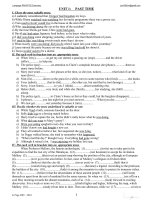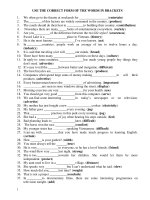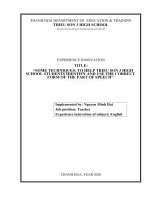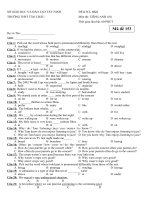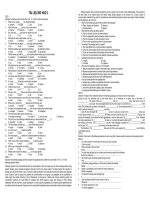- Trang chủ >>
- Đề thi >>
- Đề thi lớp 3
PRACTICE UNIT 1 G9
Bạn đang xem bản rút gọn của tài liệu. Xem và tải ngay bản đầy đủ của tài liệu tại đây (107.88 KB, 6 trang )
<span class='text_page_counter'>(1)</span>Test 1 I/Choose the best answer 1.I wish Susan……………. harder for her examination. A.will work B.worked C. has worked D.works 2.What were you doing when he ………………….. ? A.comes B.to come C.came D.coming 3.A good letter needs perfect……………………. A.introduce B.introduction C.introducing D.introductory 4.It seems difficult for us …………. abroad at the moment. A.go B.to go C.went D.gone 5.There used ……… a movie theater here, but it closed a long time ago. A.be B.to be C.being D.been 6.I come from Vietnam so I am not used to …………. on the left. A.drive B.drove C.driven D.driving 7.Although we are far away from each other, we still …………….. A.keep in touch B.say hello C.keep together D.keep on 8.Music and paiting are ……………… subjects. A.option B.optional C.optionally D.optioning 9.The children are playing ………… in the schoolyard. A.happy B.happily C.happiness D.unhappy 10.I wish they ……………….. here tomorrow. A.will come B.would come C.come D.came II/Use “used to” or “ be used to” to complete the sentences 1.They are used to/ used to go to Dalat in summer. 2.They are used to / used to playing soccer in the park. 3.I am used to/ used to getting up early. 4.Tom is used to/used to do his homework in the evening. 5.Lan is used to/used to writing to Maryam. 6.He is used to/ used to work at night. 7.Do they use to/ Are they used to watching TV/ 8.Is she used to/Did she use to playing badminton? 9.My father is used to/used to come home late. 10.She is used to/ used to go swimming in the afternoon. III/Make sentences with “I wish……” based on the given situation 1.What a pity! You aren’t here with us now. - ………………………………………………………………………… 2.The naughty boys always draw on the wall. - ………………………………………………………………………… 3.I’d like my father to give up smoking. -………………………………………………………………………… 4.He doesn’t help his mother with housework. - ………………………………………………………………………… 5.I can’t swim. -………………………………………………………………………… 6.My friends often go on a camping trip without me..
<span class='text_page_counter'>(2)</span> -………………………………………………………………………… 7.I must go now. -………………………………………………………………………… 8.He always goes to school late. - ………………………………………………………………………… 9.My brother is too short to play basketball. - ………………………………………………………………………… 10.I don’t have enough money to help you. - ………………………………………………………………………… IV/Put the verbs in the brackets in the correct form 1.They used to …………………. swimming in the afternoon. (go) 2.He wishes he ………………. a doctor. (be) 3.Is Lan used to …………… to Peter? (write) 4.They ………………. their work yet.(not finish) 5.I wish they ………………… here tomorrow.(be) 6.I would rathert you ………………… the test well.(do) 7.It’s time we ……………… the bus . (catch) 8.Did Lan use to ………………. to Maryam? ( write) 9.I wish they ………………. here now.(be) 10.It’s time we …………….. (go) V/Rewrite sentences 1.John smoked a lot a year ago, but now he doesn’t smoke any more. - John used ……………………………………………………………… 2.It’s time for you to go to school. - It’s time you …………………………………………………………… 3.How long is it since you saw Tom? - When ………………………………………………………………… 4.Please keep silent in the classroom. - I’d rather you ………………………………………………………… 5.He can’t pass the examination. - He wishes ……………………………………………………………… 6.We can’t go out because of heavy rain. - We wish ……………………………………………………………… 7.I don’t like you to come to classlate. - I’d rather you ………………………………………………………… 8.What a pity! He can’t come here. - I wish ………………………………………………………………… 9.they often went to Vung Tau at weekends. - They used ……………………………………………………………… 10.I’m sorry, I can’t help you. - I wish ………………………………………………………………… Match the word to its definition. 1. Pen pal 2. Mosque 3. Climate 4. Religion 5. Currency.
<span class='text_page_counter'>(3)</span> 6. Compulsory 7. Tuition 8. Mausoleum a) The system of money used in a country b) A large impressive tomb c) Someone who you regularly write friendly letters to but have never met d) Money that you pay to take classes e) A building in which Muslims worship f) Believing in a god g) The regular pattern of weather conditions h) Required by the rule 1…2…3…4…5…6…7…8… II. Complete the sentences with the verbs given corresponded impress prayed comprises divided depends separated enjoys 1. The living accommodation _______ three bedrooms, a kitchen, and a bathroom. 2. We’ve _______ with each other for 10 years, but I’ve never actually met him. 3. The children were _______ into three groups. 4. The priest _______ for the dying man. 5. The sights of the city never fail to _______ foreign tourists. 6. She was _______ from her mother when she was three. 7. The hotel _______ a magnificent view of the harbor. 8. Their future _______ on how well they do in school. III. Use the correct form of the word given to complete each sentence. 1. First _______ can be misleading. (impress) 2. I enjoy working there, everyone is so _______. (friend) 3. The editor welcomes _______ from the readers on any subject. (correspond) 4. Some people have no _______ beliefs. (religion) 5. By the age of eighteen he was completely _______ of his parents. (depend) 6. English and French are Canada’s _______ languages. (office) 7. America’s _______ production fell for the fourth successive month. (industry) 8. How can we make the subject more _______ to young people. (interest) 9. Many parents opposed the _______ of classes into different sets. (divide) 10. A school outfit is no longer _______. (compel) IV. Complete the sentences. Put the verb into the correct form, positive or negative. 1. Sue _______ (drink) a cup of coffee before class this evening. 2. When it _______ (begin) to rain yesterday afternoon, I _______ (shut) all of the windows in the apartment. 3. Bob _______ (hurt) his finger when he _______ (fix) his dinner. He accidentally _______ (cut) it with a sharp knife. 4. I _______ (have) any money in my pocket at all. I _______ (spend) my last dime yesterday. I’m flat broke. 5. Mary _______ (throw) her shoes away. She _______ (keep) them. 6. Yesterday I _______ (call) Marvin on the phone. He _______ (be) home, so I _______ (speak) to his sister. 7. Peter _______ (be) nervous when he _______ (hold) his baby in his arm for the first time. 8. They still _______ (live) in the small house they _______ (buy) 30 years ago. 9. I haven’t seen Alan for ages. When I last _______ (see) him, he _______ (try) to find a job in London. 10. Jack _______ (lose) his pocketknife at the park yesterday. This morning he _______ (go) back to the park to look for it. Finally he _______ (find) it in the grass. He was glad to have it back. V. Write the sentences beginning with I wish … 1. I don’t know many people in the town …………………………………………………………………. 2. It would be nice to be able to fly a plane. ………………………………………………………………. 3. It’s a shame I don’t have a key. ………………………………………………………………………… 4. Ann isn’t here and I need to see her. …………………………………………………………………… 5. I don’t like being so short. ……………………………………………………………………………… 6. Unfortunately, I have to work tomorrow. ……………………………………………………………… 7. Don’t shout all the time. It’s so annoying. ……………………………………………………………... 8. I’m sorry. I can’t go to the party. ………………………………………………………………………. 9. I’d like to get access to the internet, but I don’t have a computer. …………………………………….. 10. It’s a pity. The weather isn’t better today. VI. Choose the correct form of the verbs..
<span class='text_page_counter'>(4)</span> 1.. 1. Mary (met / was meeting) her husband while she (work / was working) in the States (an informal name of the USA). 2. Why does Warren keep shouting at people? He (wasn’t being / didn’t use to be) so bad-tempered. 3. How long is it since you (have / had) a holiday? 4. The last time I (have gone / went) to Brighton (is / was) in August. 5. I wish I (live / lived) in a big city. It’s so boring in the country. 6. (Did you buy / Have you bought) anything at the antiques sale yesterday? 7. Sandra (paid / was paying) for her things when she (heard / was hearing) someone call her name. 8. Mai (knows / knew) a little English, so she wishes she (can / could) speak it fluently. 9. When my brother (is / was) in the army, I (write / wrote) to him twice a month. 10. You’re always tired. I wish you (don’t go / didn’t go) to bed so late. VII. Fill in the blank with the correct preposition 1. How long is she planning to stay _______ you? 2. We haven’t seen Jane _______ a while. 3. I walked _______ several hotels _______ my way _______ the gas station. 4. The young birds depend _______ their parents for food _______ several weeks. 5. This job is a lot different _______ what I’m used to. 6. Most students are interested _______ sports. 7. The teacher divided the class _______ five groups. 8. His breakfast consists _______ dry bread and a cup of tea. 9. Their yard is separated _______ the factory _______ a tall fence. 10. _______ Friday, Maryam wanted to visit the mosque _______ Hang Luoc Street. VIII. Read the passage carefully, then decide whether the following statements are true (T) or false (F). Canada is the world’s second largest country. Its population is not very large, however. About 25 million people live in Canada – less than half of the population of Britain or France and only one thirtieth of the population of India. Canada is in North America and its capital is Ottawa. It is a rich country with a lot of natural recourses. In southern Canada the land is very good for farming and Canada exports a lot of wheat. In the north there are magnificent forests. In the west there are some very high mountains called the Rockies. Canada also has many minerals such as petroleum, gas, copper, and zinc. Canada was first settled by French pioneers. In the eighteenth century there were wars between Britain and French, and Canada came under British rule. Since 1931 Canada has been an independent member of the English Commonwealth. English and French are both official language in Canada. 1. Canada is a densely populated country. _______ 2. Canada is in the north of the USA. _______ 3. Canada is a country rich in natural recourses. _______ 4. Canada is the world’s leading exporter of wheat. _______ 5. Canada is a former British colony. _______ 6. Two official languages are spoken in Canada. _______ IX. Write the second sentence so that it has a similar meaning to the first. Use the word in brackets. 1. There were lights on the spacecraft. (had) 2. I had my old coat on. (wearing) 3. It isn’t true that I made a mistake. (didn’t) 4. No one told me about the change of the plan. (know) 5. When I was a child we lived in Bristol. (used) 6. My friend was the winner of the competition. (won) 7. Is it the fact that the Romans build this wall? (did) 8. She’s sorry that she can’t play the piano. (wishes) 9. Our trip to Africa was in October. (We) 10. It was breakfast – time when Susan rang. (I) I. Match the word to its definition. 1-c 2-e 3-g 4-f 5-a 6-h 7-d 8-b II. Complete the sentences with the verbs given 1- comprises 2- corresponded 3- divided 4- prayed 5- impress 6- separated 7- enjoys.
<span class='text_page_counter'>(5)</span> 8- depends III. Use the correct form of the word given to complete each sentence. 1-impression 2-friendly 3-corespondence 4-religious 5-independent 6-offcial 7-industrial 8-interesting 9-division 10-compulsory IV. Complete the sentences. Put the verb into the correct form, positive or negative. 1-drank 2-began – shut 3-hurt – was fixing – cut 4- don’t have – spent 5-threw – didn’t keep 6-called – wasn’t – spoke 7-was – held 8-live – bought 9-saw – was trying 10-lost – went - found V. Write the sentences beginning with I wish …1. I don’t know many people in the town …………………………………………………………………. I wish I knew lots of people in the town. 2. It would be nice to be able to fly a plane. ………………………………………………………………. I wish I could fly a plane 3. It’s a shame I don’t have a key. ………………………………………………………………………… I wish I had a key 4. Ann isn’t here and I need to see her. …………………………………………………………………… I wish Ann were here 5. I don’t like being so short. ……………………………………………………………………………… I wish I were taller 6. Unfortunately, I have to work tomorrow. ……………………………………………………………… I wish I didn’t have to work tomorrow 7. Don’t shout all the time. It’s so annoying. ……………………………………………………………... I wish you didn’t shout all the time 8. I’m sorry. I can’t go to the party. ………………………………………………………………………. I wish I could go to the party 9. I’d like to get access to the internet, but I don’t have a computer. …………………………………….. I wish I had a computer 10. It’s a pity. The weather isn’t better today. I wish the weather were better today VI. Choose the correct form of the verbs. 1. Mary (met / was meeting) her husband while she (work / was working) in the States (an informal name of the USA). 2. Why does Warren keep shouting at people? He (wasn’t being / didn’t use to be) so bad-tempered. 3. How long is it since you (have / had) a holiday? 4. The last time I (have gone / went) to Brighton (is / was) in August. 5. I wish I (live / lived) in a big city. It’s so boring in the country. 6. (Did you buy / Have you bought) anything at the antiques sale yesterday? 7. Sandra (paid / was paying) for her things when she (heard / was hearing) someone call her name. 8. Mai (knows / knew) a little English, so she wishes she (can / could) speak it fluently. 9. When my brother (is / was) in the army, I (write / wrote) to him twice a month. 10. You’re always tired. I wish you (don’t go / didn’t go) to bed so late. VII. Fill in the blank with the correct preposition 1. How long is she planning to stay __with_____ you? 2. We haven’t seen Jane __for_____ a while. 3. I walked ___past____ several hotels ___on____ my way ___to____ the gas station. 4. The young birds depend __on_____ their parents for food ___in____ several weeks..
<span class='text_page_counter'>(6)</span> 5. This job is a lot different __from_____ what I’m used to. 6. Most students are interested ____in___ sports. 7. The teacher divided the class __into_____ five groups. 8. His breakfast consists ___of____ dry bread and a cup of tea. 9. Their yard is separated ___from____ the factory __by_____ a tall fence. 10. ____On___ Friday, Maryam wanted to visit the mosque ___on____ Hang Luoc Street. VIII. Read the passage carefully, then decide whether the following statements are true (T) or false (F). Canada is the world’s second largest country. Its population is not very large, however. About 25 million people live in Canada – less than half of the population of Britain or France and only one thirtieth of the population of India. Canada is in North America and its capital is Ottawa. It is a rich country with a lot of natural recourses. In southern Canada the land is very good for farming and Canada exports a lot of wheat. In the north there are magnificent forests. In the west there are some very high mountains called the Rockies. Canada also has many minerals such as petroleum, gas, copper, and zinc. Canada was first settled by French pioneers. In the eighteenth century there were wars between Britain and French, and Canada came under British rule. Since 1931 Canada has been an independent member of the English Commonwealth. English and French are both official language in Canada. 1. Canada is a densely populated country. ___F____ 2. Canada is in the north of the USA. ___F____ 3. Canada is a country rich in natural recourses. __T_____ 4. Canada is the world’s leading exporter of wheat. ___F____ 5. Canada is a former British colony. ___T____ 6. Two official languages are spoken in Canada. ___T____ IX. Write the second sentence so that it has a similar meaning to the first. Use the word in brackets. 1. There were lights on the spacecraft. (had) The spacecraft had lights on it 2. I had my old coat on. (wearing) I was wearing my old coat 3. It isn’t true that I made a mistake. (didn’t) I didn’t make a mistake 4. No one told me about the change of the plan. (know) I didn’t know about the change of the plan 5. When I was a child we lived in Bristol. (used) We used to live in Bristol 6. My friend was the winner of the competition. (won) My friend won of the competition 7. Is it the fact that the Romans build this wall? (did) Did the Romans build this wall? 8. She’s sorry that she can’t play the piano. (wishes) She wishes she could play the piano 9. Our trip to Africa was in October. (We) We went to Africa in October 10. It was breakfast – time when Susan rang. (I) I was having breakfast when Susan rang.
<span class='text_page_counter'>(7)</span>
